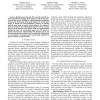Free Online Productivity Tools
i2Speak
i2Symbol
i2OCR
iTex2Img
iWeb2Print
iWeb2Shot
i2Type
iPdf2Split
iPdf2Merge
i2Bopomofo
i2Arabic
i2Style
i2Image
i2PDF
iLatex2Rtf
Sci2ools
ICML
2010
IEEE
2010
IEEE
Internal Rewards Mitigate Agent Boundedness
Abstract--Reinforcement learning (RL) research typically develops algorithms for helping an RL agent best achieve its goals-however they came to be defined--while ignoring the relationship of those goals to the goals of the agent designer. We extend agent design to include the meta-optimization problem of selecting internal agent goals (rewards) which optimize the designer's goals. Our claim is that well-designed internal rewards can help improve the performance of RL agents which are computationally bounded in some way (as practical agents are). We present a formal framework for understanding both bounded agents and the meta-optimization problem, and we empirically demonstrate several instances of common agent bounds being mitigated by general internal reward functions.
| Added | 09 Nov 2010 |
| Updated | 09 Nov 2010 |
| Type | Conference |
| Year | 2010 |
| Where | ICML |
| Authors | Jonathan Sorg, Satinder P. Singh, Richard Lewis |
Comments (0)

